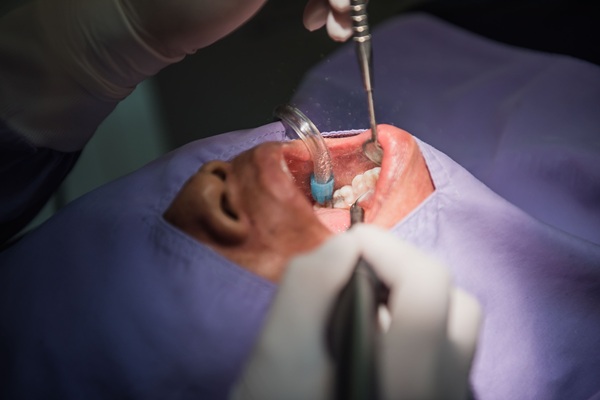Is Wisdom Teeth Removal Considered Oral Surgery?

Wisdom teeth removal is considered a type of oral surgery. However, unlike with more invasive surgeries, most patients are able to return home the same day and resume normal activities within the week. Understanding the procedure and aftercare helps patients know what to expect for an extraction.
Wisdom teeth removal
Wisdom teeth are the third set of molars and the last teeth to appear. While the rest of the permanent teeth have grown in by about 13 years old, these arrive around ages 17-25. They are often already crowded by the time they arrive.
For some, wisdom teeth grow in without issue. However, for others, these teeth grow abnormally, causing pain, infection, crowding or cavities. They can be trapped in the jaw or grow at angles as severe as 90 degrees. Teeth that do not erupt through the gums, called “impacted” teeth, require more invasive procedures than ones that have grown in normally. Since problems can develop later in life even with normally erupting wisdom teeth, though, some dentists suggest removing any wisdom teeth preemptively.
If the wisdom teeth have fully erupted, they can be pulled out with minimal impact on the gums. If a tooth is impacted, oral surgery can involve making an incision in the gum or jaw deep enough to reach the offending tooth. The tooth is often cut into smaller pieces to minimize the size of incision needed. If standard stitches are used, the patient will have to return for their removal. Dissolving stitches have become standard in many dentist offices.
Recovery
The dental professional will give instructions to follow after the surgery to help ensure a smooth recovery. The patient generally will have swelling of the face and perhaps some bruising, but there should be minimal pain. The swelling should subside after about three days. In the meantime, an ice pack can be used to reduce the severity — applying cold for approximately 20 minutes each hour is a good rule of thumb. To stop any bleeding, the patient should place gauze in the back of the mouth and bite down until the flow subsides.
During the first day or two after surgery, only soft foods are allowed. Applesauce, soups, mashed potatoes and yogurt are all good options. Straws should be avoided as the sucking action can reopen the incision. Over the next several days, the patient can slowly add in additional soft foods like rice, pasta and pancakes as these become comfortable. It is important to rinse the mouth after eating to prevent food particles from lodging in the wound. Smoking should be avoided for as long as possible but certainly for the first three days.
Conclusion
While wisdom teeth extraction is a type of oral surgery, it is minimally invasive and is usually followed by quick recovery. Impacted teeth require a more complex procedure and slightly longer recovery time. Even with involved procedures, though, most patients are able to resume normal activities within a week.
Request an appointment here: https://totalcaredentalchicago.com or call Total Care Dental at (773) 786-9586 for an appointment in our Chicago office.
Check out what others are saying about our dental services on Yelp: Oral Surgery in Chicago, IL.
Related Posts
A dentist can take many approaches to treat oral health issues. Lifestyle changes, more frequent cleanings, dental work, and medication may be used. Oral surgery may also need to be incorporated into a patient's treatment plan. Even though healthy alternatives exist that can help reduce pain and improve tooth and gum health, there are circumstances…
The idea of oral surgery can be intimidating, especially when your dentist recommends it. It is easy to understand the extra layer of anxiety that happens when the dentist goes on to refer you to a specialist.As you picture an unfamiliar person coming at your mouth with sharp instruments, you ask yourself: Do you really…
Common oral surgery procedures such as tooth extraction, wisdom tooth removal, and the fitting of dental implants require you to watch what you eat and drink after the surgery — but choosing the right food and drink can be a challenging task.Since you might be temporarily incapacitated after your oral surgery procedure due to anesthesia,…
Dental implants are often used to replace individual teeth but can also offer multiple teeth replacement options. Such options include cantilever bridges, implant-supported bridges and implant-supported partials.Depending upon the condition of the person's gums and jawbone, a single implant can sometimes be placed to support two adjacent teeth. More commonly, multiple implants are used to…

